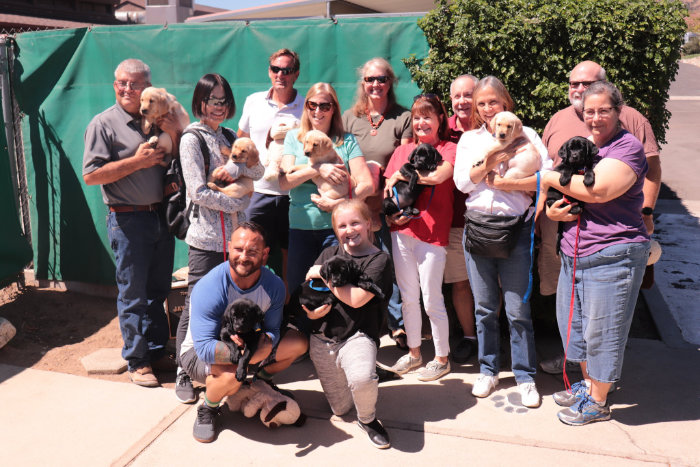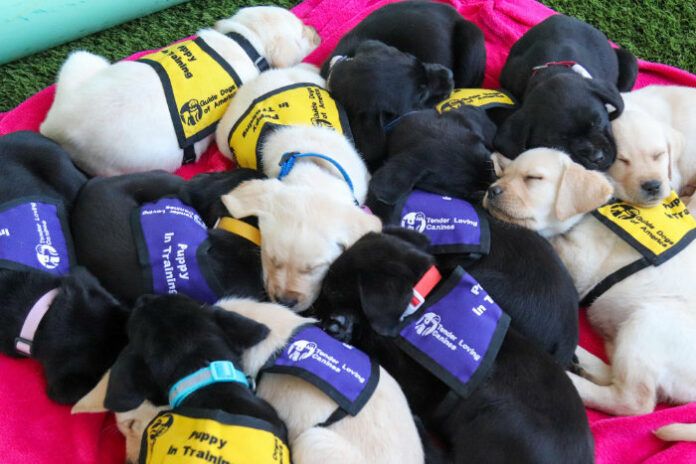Well-trained assistance dogs can open the door to increased confidence, independence, and mobility for people living with a variety of disabilities. It’s been estimated that there are more than 500,000 assistance dog/handler teams in the United States.
Within the United States, assistance dogs are not required to be trained by a professional organization, but many of them are. And most of the time, those program dogs begin their journeys toward becoming working assistance dogs in the homes of volunteer puppy raisers.
At Guide Dogs of America / Tender Loving Canines (GDA/TLC), where I serve as the puppy program coordinator, we like to say, “Puppy raisers make teams come true!” We literally can’t fulfill our mission of “transforming lives through service dogs” without the support and commitment of our volunteer puppy raisers.
Our puppy raisers spend a little more than a year raising, training, and socializing our program dogs to the big world around them. Raisers attend training classes and monthly meetings, and work to incorporate the dogs into much of their daily lives. Dogs accompany raisers everywhere they go: to the office, market, post office, dentist, on public transportation, etc. College students bring their program dogs with them to classes, and in some cases, our high school-age junior handlers get permission to bring program dogs to school.
All of this is to help ensure our puppies grow into well-behaved, confident adult dogs ready to begin learning specialized guide dog and service dog skills when they return to our campus at about 15 months old.

People often say, “I’d love to raise a service dog puppy, but I could never give it up.” When it’s time to send your program puppy “off to college,” of course it’s bittersweet. But here’s the thing. You aren’t “giving the dog up,” you’re “giving the dog forward.” You choose to raise a program puppy to help a veteran experience relief from debilitating PTSD. You raise a program puppy so a child with autism learns communication and social interaction skills. You raise a program puppy so a person who is blind or visually impaired regains independence and stands tall and proud as they safely walk down the street – just to name a few of the specialized training programs that exist.
You raise a program puppy to transform a life.
And the best part? Most people discover it’s not just the disabled clients whose lives are transformed. Puppy raising changes lives every step of the way. From the friendships that develop working alongside fellow raisers to the intense feelings of pride when you learn your dog has been matched to a partner and you meet the new team, you’ll likely feel your life has been transformed as well.
Still not sure how you’d handle puppy turn-in day? Attend the graduation of a local service dog organization and hear from the newly matched teams themselves! You can even tune-in online on Saturday, Oct. 2 as GDA/TLC broadcasts our next guide dog and service dog graduation via the organization’s Facebook page. There’s rarely a dry eye in the house.

Raising a program puppy is a wonderful way to blend a love of dogs with a desire to make a difference. If you’re in Southern California, I hope you’ll consider raising a puppy with Guide Dog of America / Tender Loving Canines. Not in So. Cal? A quick Google search for “service dog puppy raising in AREA” will likely surface a local option. There’s *always* a need for volunteer puppy raisers.
We are currently seeking raisers to welcome puppies heading into raiser homes throughout October and beyond. To learn more about GDA / TLC’s program, visit https://www.guidedogsofamerica.org/gda-programs/puppy-raising/.







What about plugging the need for puppy raisers in other assistance dog organizations?
She did. “Not in So. Cal? A quick Google search for “service dog puppy raising in AREA” will likely surface a local option. There’s *always* a need for volunteer puppy raisers.”
I have my third guide dog from Guide Dogs for the Blind and I really appreciate your article.
We absolutely rely on our puppy raisers to I still the best behaviour when their little jackets are on. Everyone I know with a guide dog is so thankful for the puppy raisers and all they do. It’s hard work raising a puppy! And letting it move forward to advanced training is even harder.
My first guide dog was from a Canadian school and I was lucky enough to become friends with her. It was the first time she had done this and she did an amazing job with my lovely golden Pepper. She had 3 kids, the oldest in high school. When people asked her how she could possibly give this wonderful dog up after loving her for 14 months, she said this.
I have 3 children that I also love and I’m raising them not to stay home forever but to go into the world and make a difference. She was preparing Pepper to go off to “university” and then start her career to change even just one life. She was an amazing dog who impacted many lives and saved mine in so many ways.
So regardless of the organization, puppy raisers are foundation for these puppies and their hard work, done with love and sacrifice are valued and appreciated beyond words!
Thank you where ever you are!💕
I did this when I lived in California. What a great experience. My sister had a seeing eye dog and suggested it. Great to see them succeed. Now I have trained service dogs myself and the latest was for my cousin who has PTSD. She is a chihuahua and so well behaved. People think only big dogs can be service dogs but being on disability at not much money a small dog was best due to his cost of food, etc. You can tell she is a service dog by her behavior. And compared to his usual 6-8 hospitalizations per year in the past he has not been hospitalized since having her. And he is much happier. He is now free to live his life, his dog has a great life and the state has saved LOTS of money. Win, win, win!!